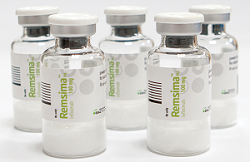Three years ago, doctors in Europe displayed grave doubts about using biosimilars instead of branded biologics on their patients. But after a couple of years of experience with a biosimilar of Merck's ($MRK) Remicade (infliximab) from Hospira and Celltrion, a new report finds doctors are much more responsive to the biologic copies.
 The survey of European Crohn's and Colitis Organization members was released Friday at ECCO's 11th Congress in Amsterdam. It found that 44.4% of physicians taking the survey considered the Remicade biosimilar, a mAb, interchangeable with the original product. That compares to only 6% who that felt that way in 2013.
The survey of European Crohn's and Colitis Organization members was released Friday at ECCO's 11th Congress in Amsterdam. It found that 44.4% of physicians taking the survey considered the Remicade biosimilar, a mAb, interchangeable with the original product. That compares to only 6% who that felt that way in 2013.
Only 19.5% of respondents had little or no confidence in the use of biosimilar monoclonal antibodies, down from 61% who gave that response in 2013. The key advantage of using biosimilars is to save money, 92.4% of respondents said, while 69% said their key concern with using them is immunogenicity. The survey was done by researchers in Europe.
"Biosimilar infliximab was the first monoclonal antibody to become available so there was some understandable trepidation around the time of launch. However, as people have been able to use the treatment, and with the large number of real-world and postmarketing studies now available, increasing numbers of clinicians are confident to use monoclonal antibody biosimilars," said Professor Silvio Danese, head of the IBD Center at the Istituto Clinico Humanitas and lead author of the survey, said in a statement released by Celltrion. "It is important that postmarketing and longer term studies with biosimilar infliximab are reported in order to further reassure clinicians and patients about biosimilars."
No one knows better than Merck & Co. ($MRK) how doctors are responding to the biosimilar in Europe, where discounts of the copy averaged 45% last year. The drugmaker reported last month that sales of Remicade, which it licenses from Johnson & Johnson ($JNJ), fell to $1.79 billion for the year, down nearly 25% from $2.37 billion in 2014.
The survey results are potentially promising for drugmakers taking biosimilars to the U.S. market which is just now opening up but offers the biggest payoff. Citigroup analysts estimate innovative biologics will lose $110 billion in sales to copycats by 2025. Pfizer ($PFE), which bought Hospira last year, now has rights to the Remicade biosimilar in the U.S. An FDA advisory panel last month recommended approval by a 21-3 vote. Several more biosimilars have been filed with the FDA for approval.
- here's an abstract of the survey
- here's the Celltrion release